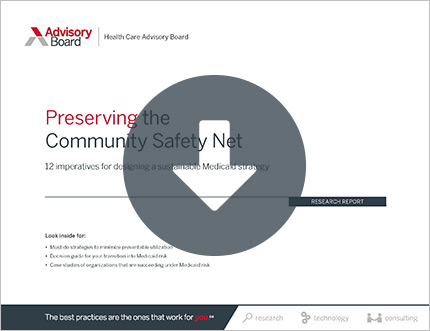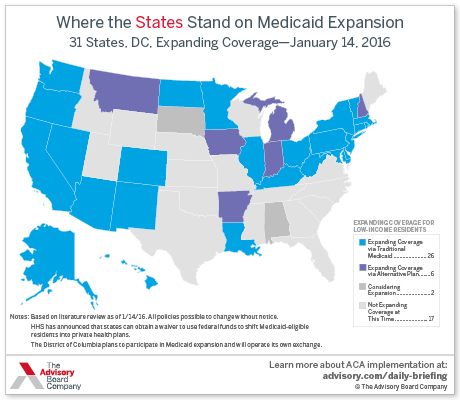Auto logout in seconds.
Continue LogoutFor years, health policy experts have debated whether the Affordable Care Act's (ACA) Medicaid expansion was improving access to and quality of care—and three new Health Affairs studies suggest the overall effects have been "positive," Aaron Carroll writes for the New York Times' "The Upshot."
August 14 webconference: How to succeed under Medicaid risk
New research shows the effects of expanding Medicaid under ACA
Improvements in access to care
In one study, researchers relied on data from 2011 to 2015 to compare community health centers (CHCs) that receive federal funding in expansion states with CHCs in states that did not expand Medicaid.
The researchers found CHCs in expansion states saw the percentage of patients who had Medicaid coverage increase by more than 13 percentage points, while the percentage of uninsured patients decreased by more than 11 percentage points.
Compared with non-expansion states, the researchers found CHCs in rural areas in expansion states had:
- 7% more patients who received appropriate weight screening and follow-up care;
- 4% more patients with asthma who received appropriate treatment; and
- 2% more patients with hypertension who were able to control their blood pressure.
It's likely that the gains result largely from Medicaid coverage making it easier for beneficiaries to visit health care professionals, Carroll writes. The gains might also result in part from Medicaid coverage making pharmaceutical coverage more affordable, Carroll notes.
The researchers observed no significant change in the quality of care between CHCs in urban areas when they compared expansion and non-expansion states.
Rise in insurance enrollment
The second study focused on Indiana's alternative Medicaid expansion, called the Healthy Indiana Plan 2.0 (HIP 2.0), which requires that beneficiaries contribute to a health savings account on a sliding scale that is based on their income to qualify for full Medicaid benefits.
Researchers from Indiana University's School of Public and Environmental Affairs sought to how more conservative versions of Medicaid—such as Indiana's—performed compared with the ACA's Medicaid expansion. To do so, they examined data on adults ages 18 to 64 from 2009 through 2016 who were likely to be affected by Medicaid's expansion to see whether they enrolled in Medicaid or other insurance.
The researchers found greater gains in health insurance coverage in states that expanded Medicaid than in states that did not expand Medicaid. They found Indiana ranked 13th out of 27 expansion states. According to the researchers, states that had higher rates of uninsured residents before they expanded Medicaid in general had larger gains. Indiana ranked in the middle before and after it expanded Medicaid.
Carroll writes that "even with these extra requirements, Indiana saw significant gains in Medicaid coverage." However, he adds, "[W]e don't know if gains would have been even larger without them. It's possible that the churn caused by cost-sharing requirements may be causing the state to underperform. Neighboring states did see larger gains than Indiana itself. But Indiana overperformed compared with other, more distant states, making this unclear."
Increases in coverage, health service use
A third study—of which Carroll was one of the authors—looked at existing literature on the effects of Medicaid expansion. For the study, the researchers conducted a systemic review of 77 studies—most of which had a quasi-experimental design and evaluated access to care—that had been published since 2014, when states began expanding their Medicaid programs. In total, the studies included "440 distinct analyses," Carroll writes.
After reviewing the analyses, the researchers found:
- More than 60% showed expanding Medicaid had a significant effect that was consistent with the ACA's goals;
- 35% showed no significant findings; and
- 4% showed expanding Medicaid had a negative effect.
The majority of the analyses Carroll writes, showed health insurance coverage improved and the use of health care services increased after states expanded their Medicaid programs.
According to Carroll, 40 of the analyses examined the quality of care, and about half showed improvements in quality measures, including diabetes monitoring and preventative care screening.
Olena Mazurenko, lead author of the systematic review, said, "With dozens of scientific analyses spanning multiple years, the best evidence we currently have suggests that Medicaid expansion greatly improved access to care, generally improved quality of care, and to a lesser degree, positively affected people's health" (Carroll, "The Upshot," New York Times, 7/2).
How to succeed under Medicaid risk—and meet the needs of your Medicaid patients
The Medicaid population presents a challenge for many health care providers. Low reimbursement rates coupled with high patient complexity are responsible for margin pressure.
Join our virtual expert panel discussion on Tuesday, August 14 to learn about key considerations for taking on Medicaid risk and setting up the right infrastructure to manage the population.
Don't miss out on the latest Advisory Board insights
Create your free account to access 1 resource, including the latest research and webinars.
Want access without creating an account?
You have 1 free members-only resource remaining this month.
1 free members-only resources remaining
1 free members-only resources remaining
You've reached your limit of free insights
Become a member to access all of Advisory Board's resources, events, and experts
Never miss out on the latest innovative health care content tailored to you.
Benefits include:
You've reached your limit of free insights
Become a member to access all of Advisory Board's resources, events, and experts
Never miss out on the latest innovative health care content tailored to you.
Benefits include:
This content is available through your Curated Research partnership with Advisory Board. Click on ‘view this resource’ to read the full piece
Email ask@advisory.com to learn more
Click on ‘Become a Member’ to learn about the benefits of a Full-Access partnership with Advisory Board
Never miss out on the latest innovative health care content tailored to you.
Benefits Include:
This is for members only. Learn more.
Click on ‘Become a Member’ to learn about the benefits of a Full-Access partnership with Advisory Board
Never miss out on the latest innovative health care content tailored to you.


